Parasitism
Parasitism is a type of symbiotic relationship between two organisms, where one organism (the parasite) benefits at the expense of the other organism (the host). The parasite derives nutrients, shelter, or other benefits from the host, while the host is harmed in the process.
Key Concepts
- Parasite: An organism that lives on or in another organism (the host) and benefits at the host's expense.
- Host: The organism that is being exploited by the parasite.
- Types of Parasites: Parasites can be classified as ectoparasites (living on the outside of the host) or endoparasites (living inside the host).
- Adaptations: Parasites have evolved various adaptations to exploit their hosts, such as specialized mouthparts, camouflage, and the ability to manipulate the host's behavior.
- Effects on Hosts: Parasitism can have negative effects on the host, including reduced fitness, disease, and even death in severe cases.
Examples of Parasitism
There are numerous examples of parasitism in the natural world, including:
- Tapeworms: Parasitic flatworms that live in the intestines of vertebrates, including humans, and absorb nutrients from the host's food.
- Mosquitoes: Ectoparasites that feed on the blood of vertebrate hosts, often transmitting diseases such as malaria and dengue fever.
- Mistletoe: A parasitic plant that grows on the branches of trees and derives water and nutrients from the host plant.
- Fleas: Ectoparasites that infest the fur of mammals, feeding on their blood and causing discomfort and disease.
Study Guide
To study parasitism, consider the following key points:
- Define parasitism and distinguish it from other types of symbiotic relationships, such as mutualism and commensalism.
- Identify and describe different types of parasites and their adaptations for exploiting hosts.
- Understand the impact of parasitism on host organisms, including potential health effects and ecological consequences.
- Examine specific examples of parasitism in nature and their relevance to human health, agriculture, and ecosystems.
- Discuss strategies for controlling and managing parasitic infections in humans, livestock, and crops.
By understanding the dynamics of parasitism, we can gain insights into the complex interactions between organisms and the importance of maintaining ecological balance.
.◂Science Worksheets and Study Guides Seventh Grade. Weathering of rocks and soil formation
Study Guide Weathering of rocks and soil formation
Weathering of rocks and soil formation  Activity Lesson
Activity Lesson Weathering of Rocks
Weathering of Rocks  Worksheet/Answer key
Worksheet/Answer key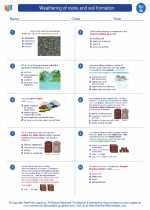 Weathering of rocks and soil formation
Weathering of rocks and soil formation  Worksheet/Answer key
Worksheet/Answer key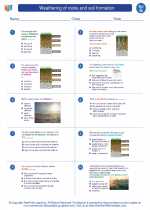 Weathering of rocks and soil formation
Weathering of rocks and soil formation  Worksheet/Answer key
Worksheet/Answer key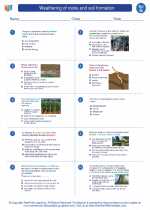 Weathering of rocks and soil formation
Weathering of rocks and soil formation  Worksheet/Answer key
Worksheet/Answer key Weathering of rocks and soil formation
Weathering of rocks and soil formation  Vocabulary/Answer key
Vocabulary/Answer key Weathering of rocks and soil formation
Weathering of rocks and soil formation  Vocabulary/Answer key
Vocabulary/Answer key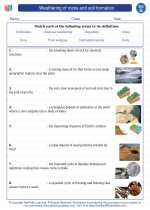 Weathering of rocks and soil formation
Weathering of rocks and soil formation  Vocabulary/Answer key
Vocabulary/Answer key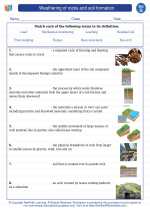 Weathering of rocks and soil formation
Weathering of rocks and soil formation  Vocabulary/Answer key
Vocabulary/Answer key Weathering of rocks and soil formation
Weathering of rocks and soil formation 

 Activity Lesson
Activity Lesson
 Worksheet/Answer key
Worksheet/Answer key
 Worksheet/Answer key
Worksheet/Answer key
 Worksheet/Answer key
Worksheet/Answer key
 Worksheet/Answer key
Worksheet/Answer key
 Vocabulary/Answer key
Vocabulary/Answer key
 Vocabulary/Answer key
Vocabulary/Answer key
 Vocabulary/Answer key
Vocabulary/Answer key
 Vocabulary/Answer key
Vocabulary/Answer key

The resources above cover the following skills:
LIFE SCIENCE
Unity and Diversity
Analyze and interpret data for patterns of change in anatomical structures of organisms using the fossil record and the chronological order of fossil appearance in rock layers.